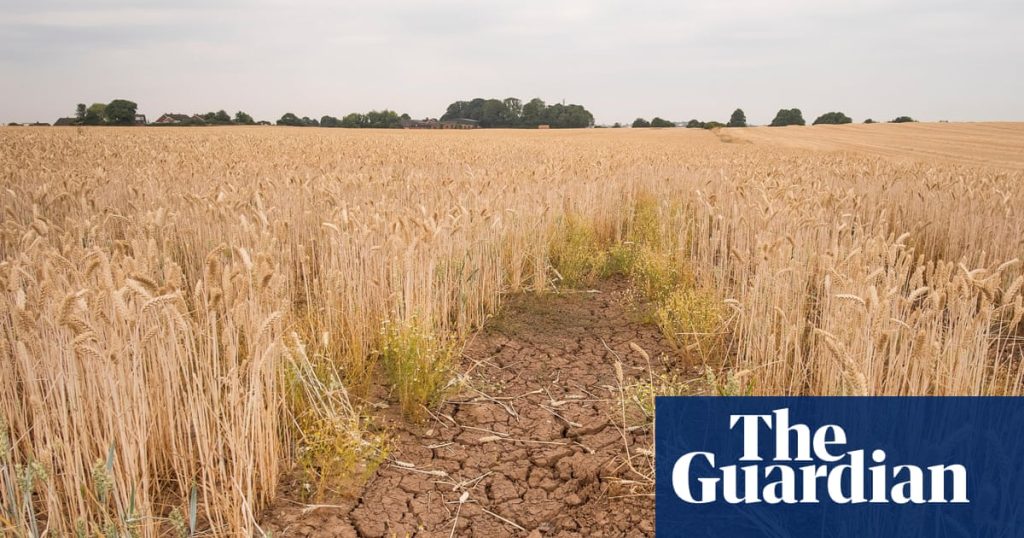Britain is at risk of a worsening “climateflation” crisis amid the fallout from increasingly extreme weather that could drive up food prices by more than a third by 2050.
Sounding the alarm over the financial impact for UK households, the Autonomy Institute thinktank said that climate-induced price increases for everyday food items risked pushing almost 1 million people into poverty without urgent government intervention.
It said the UK was at elevated risk – particularly from heatwaves and droughts – of food production and supply chains abroad and at home being disrupted, which would have a knock-on impact for consumers through higher prices in the shops.
Official figures earlier this month showed the UK’s headline inflation rate rose by more than expected to 3.6% in June, as fuel and food prices added to the pressure on households.
Britain’s largest retailers have warned hot, dry weather had reduced fruit and vegetable harvest yields, adding to last month’s inflation rate. The price of chocolate on UK supermarket shelves has also been pushed up by poor harvests linked to extreme temperatures in west Africa, while coffee prices have been pumped up by bad weather hitting production in Brazil and Vietnam.
Drawing together climate data, analysis of international and domestic trade flows, and economic modelling, the Autonomy researchers said that increasing numbers of heatwaves and droughts would imperil staple crops, disrupt supply chains and intensify inflationary pressures.
Scientists say climate breakdown caused by the burning of fossil fuels means more frequent floods and droughts are likely in the UK. Food prices worldwide have also been affected by poor harvests, conflict and Donald Trump’s trade wars.
With almost half of food consumed in the UK imported from overseas, British households are highly vulnerable to climate shocks hitting the price of groceries from key producers in countries including Spain, France and Brazil.
Domestic farming is also under pressure, with storms and floods slashing UK vegetable production by 12% in 2023.
Warning that rising temperatures affecting major food producers in Europe and beyond stood as a major risk to household finances, the report said by 2050, under a high-emission “worst-case” scenario, food prices could rise by 34%.
Under a “best-case” scenario, whereby global heating would be limited to 1.5C by 2100 rather than 4C in the worst-case, it warned that cumulative food price inflation could still reach 25% by 2050.
Lower-income households would be disproportionately hit because they spend a larger share of their monthly budgets on essential items such as bread, rice and meat. It said heatwaves in the UK, as one of several drivers of climateflation, could cost an average household between £917 and £1,247 by 2050.
Sign up to Business Today
Get set for the working day – we’ll point you to all the business news and analysis you need every morning
Privacy Notice: Newsletters may contain info about charities, online ads, and content funded by outside parties. For more information see our Privacy Policy. We use Google reCaptcha to protect our website and the Google Privacy Policy and Terms of Service apply.
after newsletter promotion
Without government efforts to soften the blow for households from a 34% rise in prices, the leftwing thinktank warned as many as 951,383 more people could fall into poverty.
Will Stronge, the chief executive of the Autonomy Institute, urged ministers to consider a range of measures to protect families; including the introduction of public diners to mitigate the impact of food price volatility for vulnerable groups.
Price controls could also be considered, while the UK could look at introducing “buffer stocks” of key goods to ensure availability during supply chain disruptions.
“Climateflation is no longer a distant risk; it’s a present reality,” Stronge said. “We need to build real economic resilience – and that means rethinking what public service provision can and should provide in the face of climate disruption: from delivery of basic essentials to publicly funded diners and a national buffer stock.”

